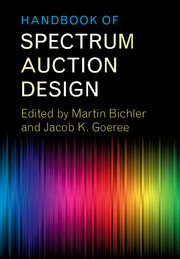Book contents
- Frontmatter
- Contents
- List of Contributors
- Preface
- List of Papers
- Part I The Simultaneous Multiple-Round Auction
- Part II The Combinatorial Clock Auction Designs
- 5 Combinatorial Auction Design
- 6 The Clock-Proxy Auction: A Practical Combinatorial Auction Design
- 7 Spectrum Auction Design
- 8 A Practical Guide to the Combinatorial Clock Auction
- 9 Market Design and the Evolution of the Combinatorial Clock Auction
- 10 Quadratic Core-Selecting Payment Rules for Combinatorial Auctions
- 11 Core-Selecting Package Auctions
- 12 A New Payment Rule for Core-Selecting Package Auctions
- 13 On the Impossibility of Core-Selecting Auctions
- 14 Ascending Combinatorial Auctions with Risk Averse Bidders
- 15 Properties of the Combinatorial Clock Auction
- 16 Budget Constraints in Combinatorial Clock Auctions
- 17 (Un)expected Bidder Behavior in Spectrum Auctions: About Inconsistent Bidding and its Impact on Efficiency in the Combinatorial Clock Auction
- Part III Alternative Auction Designs
- Part IV Experimental Comparisons of Auction Designs
- Part V The Bidders’ Perspective
- Part VI Secondary Markets and Exchanges
- Outlook
- References
11 - Core-Selecting Package Auctions
from Part II - The Combinatorial Clock Auction Designs
Published online by Cambridge University Press: 26 October 2017
- Frontmatter
- Contents
- List of Contributors
- Preface
- List of Papers
- Part I The Simultaneous Multiple-Round Auction
- Part II The Combinatorial Clock Auction Designs
- 5 Combinatorial Auction Design
- 6 The Clock-Proxy Auction: A Practical Combinatorial Auction Design
- 7 Spectrum Auction Design
- 8 A Practical Guide to the Combinatorial Clock Auction
- 9 Market Design and the Evolution of the Combinatorial Clock Auction
- 10 Quadratic Core-Selecting Payment Rules for Combinatorial Auctions
- 11 Core-Selecting Package Auctions
- 12 A New Payment Rule for Core-Selecting Package Auctions
- 13 On the Impossibility of Core-Selecting Auctions
- 14 Ascending Combinatorial Auctions with Risk Averse Bidders
- 15 Properties of the Combinatorial Clock Auction
- 16 Budget Constraints in Combinatorial Clock Auctions
- 17 (Un)expected Bidder Behavior in Spectrum Auctions: About Inconsistent Bidding and its Impact on Efficiency in the Combinatorial Clock Auction
- Part III Alternative Auction Designs
- Part IV Experimental Comparisons of Auction Designs
- Part V The Bidders’ Perspective
- Part VI Secondary Markets and Exchanges
- Outlook
- References
Summary
Introduction
Recent years have seen several new and important applications of matching procedures in practical applications, including school assignments in New York and Boston and new designs for life-saving organ exchanges. The mechanisms that have been adopted, and sometimes even the runner-up mechanisms, are stable matching mechanisms. Recall that stable matches are matches with the property that no individual can do better by staying unmatched and no pair can both do better by matching to one another. Since pairs are the only significant coalitions in this theory, stable matches are a kind of core allocation. Stable matching mechanisms are direct mechanisms that select a stable match with respect to the reported preferences; the definition does not require that the mechanism be incentive-compatible.
Evidence suggesting that stable matching mechanisms remain in use long after unstable mechanisms have been abandoned is found both in empirical studies (Roth and Xing 1994) and in laboratory experiments (Kagel and Roth 2000). If stable mechanisms actually lead to stable matches, then these mechanisms have the important practical advantage that no couple that would prefer to renege after the mechanism is run in favor of some alternative pairing, because no such agreement can be better for both members of the couple than the outcome of a stable matching mechanism. Even for a stable mechanism, with enough uncertainty, there might be pairs that could increase their expected payoffs by matching in advance, but the resulting unstable match would be vulnerable to defections by parties who might find a better alternative.
A similar analysis applies to core-selecting auction mechanisms. An individually rational outcome is in the core of an auction game if and only if there is no group of bidders who would strictly prefer an alternative deal that is also strictly better for seller. Consequently, an auction mechanism that delivers core allocations has the advantages that there is no individual or group that would want to renege after the auction is run in favor of some allocation that is feasible for it and any non-core agreement made before the auction is vulnerable to defections, as the seller attracts better offers afterwards.
Information
- Type
- Chapter
- Information
- Handbook of Spectrum Auction Design , pp. 226 - 240Publisher: Cambridge University PressPrint publication year: 2017
